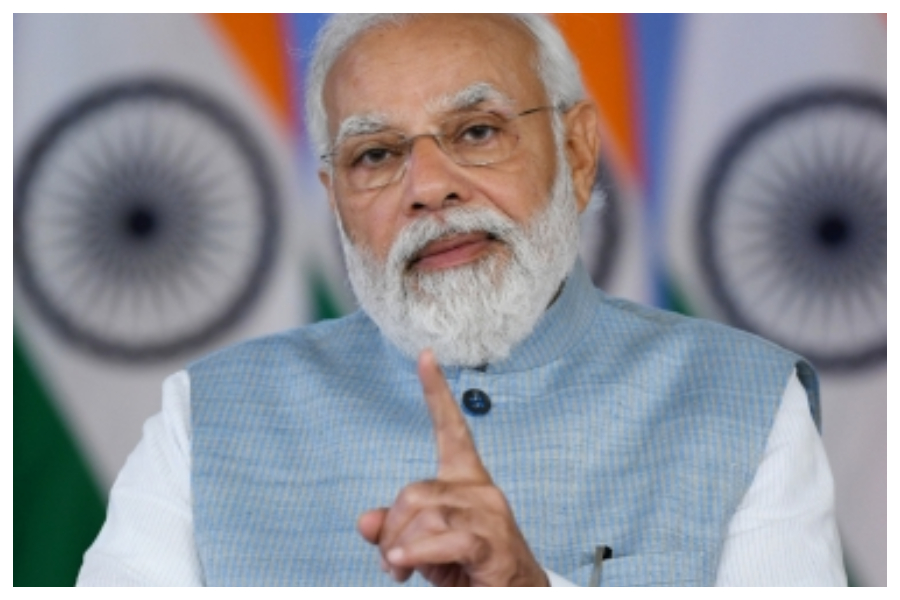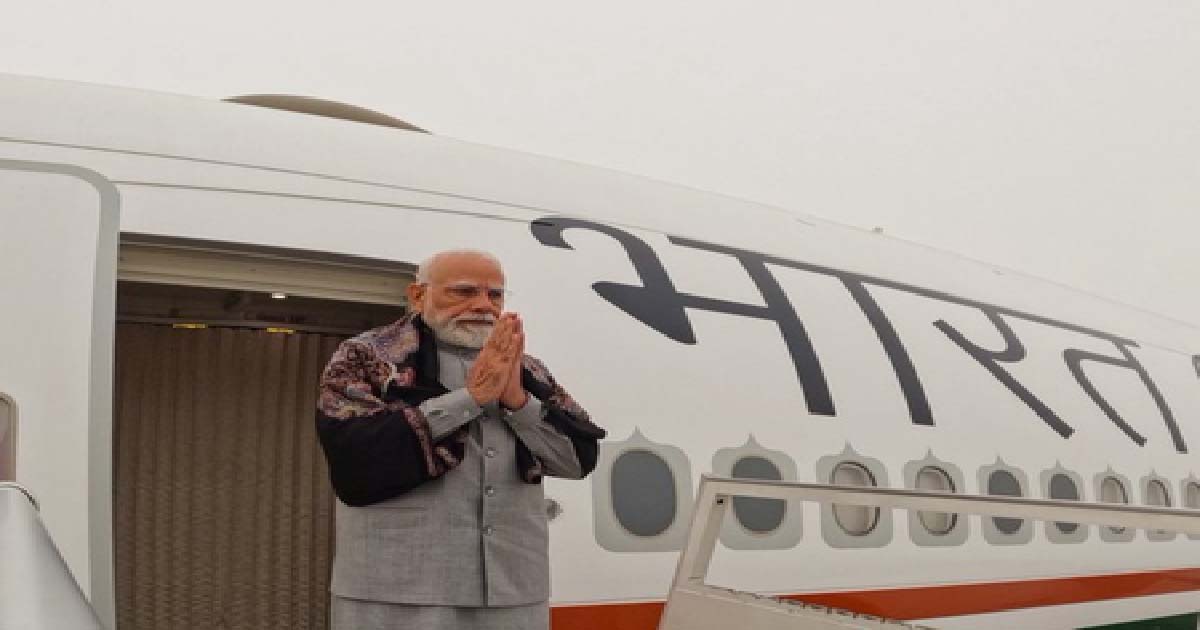Business
Budget can be effective means to bring change in agriculture: PM

Emphasising that the agriculture budget allocation this year is much more than previous years, Prime Minister Narendra Modi on Thursday said it is aimed at the complete modernisation of the sector and suggested seven pointers from the budget provisions.
In just six years the agriculture budget has increased manifold and agriculture loans for farmers have also increased by two and half times in the last seven years, the Prime Minister said, and added that the preparation for multiple schemes that have been discussed during this budget need preparation, for which the month of March can be utilized and then, “start rolling out right from day one in the new financial year.”
If all this is done properly, the budget will not just be a numbers game but, in reality, can be an effective means to bring about change in life, change in agriculture,” he said while addressing a webinar on the positive impact of Union Budget 2022 in the Agriculture sector.
The seven important pointers from the budget that Modi mentioned started with the provision for natural farming along the Ganga banks on both sides up to five kms, including a push for herbal, medicinal plants and also for horticulture; infusion of modern technology for improving agriculture and horticulture practices; focus on Mission Oil Palm and encouragement to other oil seeds too for lessen the import burden on edible oil and incorporating new schemes under PM Gati Shakti for transportation of agriculture goods.
The other three pointers were how agri-waste management will be better organised, how waste to energy solutions will not just help bringdown carbon emissions but also increase farmers’ income; the regular bank-like facilities that the farmers will get from across 1.5 lakh post offices across India and, last but not the least, the need for changes to be brought in for investment in agri-research along with skill development, human resources development, etc., in the education sector.
Recounting the work done by his government in previous years, Modi recalled how three years ago the PM Kisan Samman Nidhi was started, and it has benefitted almost 11 crore farmers, most of them small farmers, till date and Rs 1.7 lakh crore has been disbursed till now under the scheme. He also talked about how his government has brought in smartness in all things related to agriculture, ‘Beej se Bazar Tak’ (from seed stage to market stage) by improving the systems over the last seven years.
The Prime Minister also appealed to the private sector to invest in the agriculture sector and described the multiple opportunities. For instance, soil health cards are prepared by the government and there can be private labs everywhere where the farmer can get his soil tested and work on fertilizers accordingly. “We need a vast network of soil testing labs just as today we have pathology labs for human health,” he said.
Modi also recounted achievements such as micro-irrigation, which is a medium to bring down input cost and improve production and something which also helps the cause of the environment. “Saving water in today’s times is a service to mankind. More crop per drop is our motto. This field too has immense possibilities,” he appealed to the private sector.
Ethanol blending, agri-startups, agri-waste management, logistics, transport of agriculture produce, food processing, drones for agriculture and farm equipment on rent are some of the fields that the Prime Minister pointed out wherein private investors, especially young entrepreneurs can enter to benefit from immense potentialities.
Business
Centre releases over Rs 260 crore for rural local bodies in Kerala

New Delhi, Dec 15: The government on Monday said it has released Rs 260.20 crore to rural local bodies in Kerala as part of the 15th Finance Commission grants for the financial year 2025-26.
The amount represents the first instalment of untied grants and covers all 14 district panchayats, 152 block panchayats and 9,414 gram panchayats (GPs) in the state, according to an official statement.
Untied grants are meant to be utilised by rural local bodies/PRIs for location-specific felt needs under the 29 subjects listed in the Eleventh Schedule of the Constitution, except for salaries and other establishment expenditures.
Tied Grants, on the other hand, are earmarked for basic services relating to sanitation and maintenance of ODF (open defecation-free) status, including management and treatment of household waste, human excreta and faecal sludge, and supply of drinking water, rainwater harvesting, and water recycling.
Last week, the government released Rs 717.17 crore to strengthen rural local bodies in Maharashtra as part of the first instalment of untied grants for the financial year 2025-26. The funds were released to duly elected and eligible rural local bodies in the state, covering two district panchayats (Zilla Parishads), 15 block panchayats (panchayat samitis), and 26,544 gram panchayats.
The government, through the Ministry of Panchayati Raj and the Ministry of Jal Shakti (Department of Drinking Water and Sanitation), recommends release of 15th Finance Commission grants to states for Panchayati Raj Institutions, which are then released by the Ministry of Finance.
The allocated grants are recommended and released in two instalments in a financial year.
Earlier in November this year, the Centre released over Rs 223 crore for rural local bodies in Assam and another Rs 444.38 crore to strengthen panchayat bodies in Odisha as part of the 15th Finance Commission grants.
Business
PM Modi’s 3-nation visit to further bolster trade and investment ties

New Delhi, Dec 15: As Prime Minister Narendra Modi embarked on a three-nation visit to Jordan, Ethiopia and Oman on Monday, bolstering economic and trade ties is among the key agenda items of his visit.
PM Modi’s visit is expected to open far-reaching opportunities to enhance the country’s economic footprint across West Asia and Africa.
Last week, the Union Cabinet, chaired by the Prime Minister, approved the proposed Free Trade Agreement (FTA) between India and Oman, aimed at deepening trade and investment relations between the two countries.
The approval also came after Oman’s Shura Council approved the Gulf nation’s proposed FTA with India. The talks for the trade agreement, officially termed the Comprehensive Economic Partnership Agreement (CEPA), formally began in November 2023.
India and Oman share a long-standing and multidimensional Strategic Partnership supported by strong trade ties, energy cooperation and cultural linkages. The economic and commercial relations between India and Oman are robust and buoyant.
The bilateral trade between the two nations reached $8.947 billion during FY 2023-2024, and for FY 2024-25, it stood at $10.613 billion, according to an official statement. Bilateral investment flows have also been strong, as reflected in numerous joint ventures established both in India and Oman.
Moreover, there are over 6,000 India-Oman joint ventures present in Oman, estimated to be adding $7.5 billion to Oman’s economy in the form of total capital investment over a long period.
PM Modi will hold high-level talks with the Sultan of Oman in Muscat and discuss strengthening the Strategic Partnership as well as the strong commercial and economic relationship between the two nations.
Notably, India is Jordan’s third-largest partner, with bilateral trade at around $2.8 billion. Jordan is a key supplier of fertilisers to India, particularly phosphates and potash.
Although the size of India-Ethiopia bilateral trade was around $550 million in FY25, India was the second largest trading partner for the African nation. India’s key exports include primary and semi-finished iron and steel products, drugs and pharmaceuticals, fertilisers and machinery, among others.
Business
Indian stock market ends in bullish tone over hopes of renewed FII inflows

Mumbai, Dec 13: Indian equity benchmarks made marginal losses during the week amid sustained FII outflows and uncertainty surrounding the US-India trade negotiations.
However, the market ended the week in a bullish tone with Nifty surging 0.57 per cent on the last trading day after the US Federal Reserve announced a 25-bps rate cut.
Benchmark indices Nifty and Sensex dipped 0.36 and 0.17 per cent during the week to close at 26,046 and 85,267, respectively.
Indian equities opened the week on a subdued note, amid continued rupee depreciation and negative global cues due to rising Japanese bond yields.
The US Fed rate cut later in the week eased liquidity concerns and fuelled hopes of renewed FII inflows. With supportive central bank policies, steady domestic investments, and optimism over trade progress despite unclear timelines, benchmarks closed the week on a strong note.
India’s year-on-year inflation rate based on the Consumer Price Index (CPI) was estimated at 0.71 per cent for November this year which was marginally higher than the 0.25 per cent in October, according to figures released by the Ministry of Statistics.
Broader indices underperformed, with the Nifty Midcap100 and Smallcap100 down 0.51 per cent and 0.67 per cent, respectively, in a week.
Sectoral performance was mixed, with IT under pressure while PSU banks, real estate and consumer durables witnessed selective buying.
Hrishikesh Yedve, AVP Technical and Derivative Research, Asit C. Mehta Investment Interrmediates, said that Nifty’s weekly chart shows buying interest at lower levels.
Nifty has 26,200 and 26,325 as stiff resistance levels while 25,700 will act as support zone, he added.
Analysts said that markets will likely remain positive in near future but sensitive to rupee stability, FII flow trends, trade agreement clarity, and cues from major central banks abroad.
Amidst risks from currency fluctuations and global trade uncertainties, improving earnings visibility and liquidity support provide a constructive backdrop and downside protection, they added.
-

 Crime3 years ago
Crime3 years agoClass 10 student jumps to death in Jaipur
-

 Maharashtra1 year ago
Maharashtra1 year agoMumbai Local Train Update: Central Railway’s New Timetable Comes Into Effect; Check Full List Of Revised Timings & Stations
-

 Maharashtra1 year ago
Maharashtra1 year agoMumbai To Go Toll-Free Tonight! Maharashtra Govt Announces Complete Toll Waiver For Light Motor Vehicles At All 5 Entry Points Of City
-

 Maharashtra1 year ago
Maharashtra1 year agoFalse photo of Imtiaz Jaleel’s rally, exposing the fooling conspiracy
-

 National News1 year ago
National News1 year agoMinistry of Railways rolls out Special Drive 4.0 with focus on digitisation, cleanliness, inclusiveness and grievance redressal
-

 Maharashtra1 year ago
Maharashtra1 year agoMaharashtra Elections 2024: Mumbai Metro & BEST Services Extended Till Midnight On Voting Day
-

 National News1 year ago
National News1 year agoJ&K: 4 Jawans Killed, 28 Injured After Bus Carrying BSF Personnel For Poll Duty Falls Into Gorge In Budgam; Terrifying Visuals Surface
-

 Crime1 year ago
Crime1 year agoBaba Siddique Murder: Mumbai Police Unable To Get Lawrence Bishnoi Custody Due To Home Ministry Order, Says Report












